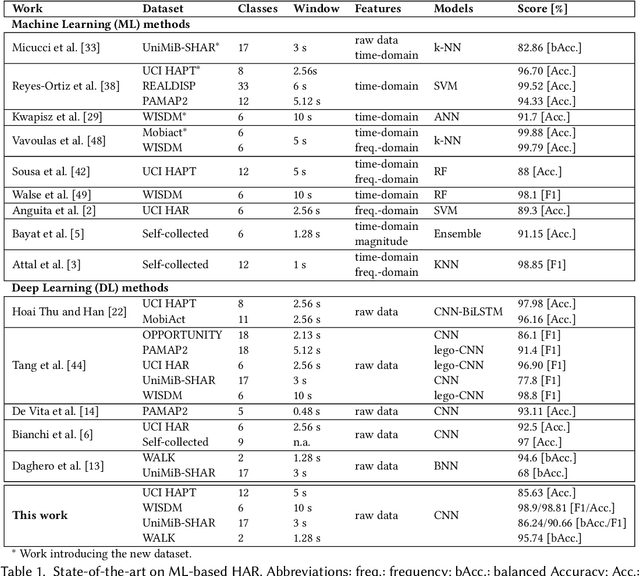Human Activity Recognition on Microcontrollers with Quantized and Adaptive Deep Neural Networks
Paper and Code
Sep 02, 2022



Human Activity Recognition (HAR) based on inertial data is an increasingly diffused task on embedded devices, from smartphones to ultra low-power sensors. Due to the high computational complexity of deep learning models, most embedded HAR systems are based on simple and not-so-accurate classic machine learning algorithms. This work bridges the gap between on-device HAR and deep learning, proposing a set of efficient one-dimensional Convolutional Neural Networks (CNNs) deployable on general purpose microcontrollers (MCUs). Our CNNs are obtained combining hyper-parameters optimization with sub-byte and mixed-precision quantization, to find good trade-offs between classification results and memory occupation. Moreover, we also leverage adaptive inference as an orthogonal optimization to tune the inference complexity at runtime based on the processed input, hence producing a more flexible HAR system. With experiments on four datasets, and targeting an ultra-low-power RISC-V MCU, we show that (i) We are able to obtain a rich set of Pareto-optimal CNNs for HAR, spanning more than 1 order of magnitude in terms of memory, latency and energy consumption; (ii) Thanks to adaptive inference, we can derive >20 runtime operating modes starting from a single CNN, differing by up to 10% in classification scores and by more than 3x in inference complexity, with a limited memory overhead; (iii) on three of the four benchmarks, we outperform all previous deep learning methods, reducing the memory occupation by more than 100x. The few methods that obtain better performance (both shallow and deep) are not compatible with MCU deployment. (iv) All our CNNs are compatible with real-time on-device HAR with an inference latency <16ms. Their memory occupation varies in 0.05-23.17 kB, and their energy consumption in 0.005 and 61.59 uJ, allowing years of continuous operation on a small battery supply.
 Add to Chrome
Add to Chrome Add to Firefox
Add to Firefox Add to Edge
Add to Edge